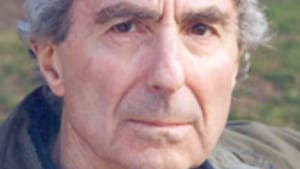Stay in the Loop
BSR publishes on a weekly schedule, with an email newsletter every Wednesday and Thursday morning. There’s no paywall, and subscribing is always free.
What Philip Roth knows about me
Philip Roth's "Indignation'

I want to write a review of Philip Roth’s new book, Indignation.
I would very much like to do that.
I want to be able to write a review that would seem at home and comfy in the New York Review of Books. A review that would wait for you, sure of itself, toward the rear end of The New Yorker. You might read the cartoons first (I do), but you would do so knowing that the review was all set to brilliantly and profoundly explicate the book.
So what am I doing instead of writing that mature and insightful review?
I am sitting here eating a bowl of skinless and boneless sardines intermixed with larges dices of onion and vinegar and washing the whole ethnic collation down with measured sips of Russian vodka.
There is a reasonable crosscurrent here, if you pay attention.
What I can write is this, and I beg your indulgence.
My only rabbi
What I remember best about going to Synagogue at Temple Sinai in Cedarhurst, New York, were Rabbi Avram Vossen Goodman’s sermons. He was my rabbi. There were none before and I have not had any since. He instructed me for my bar mitzvah. He officiated at my confirmation. He scolded me when I was 11 for making a bit too much noise during religious school, and he winced at my sermons when, as president of the youth group, I pontificated (if you can do that in a synagogue) about topics I cannot at all recall but must have found quite inspiring at the time. He also officiated at my wife’s funeral as I lay quite broken, in every sense of the word, in a hospital hundreds of miles from that small plot of ground. I took him seriously. The brief time I contemplated entering the rabbinate was due to him.
A good sermon is a general thing that so resonates with its listeners that they take it as specifically relating to their lives, opinions or beliefs. It sits there on the kitchen table with that night’s coffee and crumb cake. It fills the silences the next morning. And though it eventually fades like the paper they print the receipts on at Wal-Mart, the change remains though the instrument of the change is forgotten.
I cannot remember the specific content of a single sermon by Rabbi Goodman. However, I am sure that I was changed each time I heard one and then discussed it, like a grownup, with my parents as I held a cup of “coffee milk” in my hand and with a piece of bobka on my plate.
To be a Jew in this odd culture
My parents are gone and I am not sitting at the kitchen table. Instead of “coffee milk” and bobka, I have that aforementioned Russian vodka and sardines.
And the closest experience to Rabbi Goodman’s sermons I have had during the last few years of intense reading and re-reading are the books of Philip Roth. This includes the latest that sits to my right: Indignation.
Each of the Roth books, in some way, shape or form, explains me to me. My odd manners of behavior become nothing really unusual. My intense self-examination and criticisms no longer remain as solitary exercises in being one’s own prosecuting attorney and spirited, involved defender.
Being the Jew I am in this odd culture that is America seems perfect under the circumstances. Suddenly I see that being anything else would have been quite impossible.
Roth’s books should be required reading of any Jew, male or female, so that a glimmer of resentful understandings can be achieved. They should be required reading of all those non-Jews who just don’t get it for one reason or another.
I mean…I pricked myself a few minutes ago and I bled.
His books spring forth from the friction and heat created where the cultures attempt to meld.
Is Indignation a great book?
I don’t know yet.
But it has changed me. I know that.
The passages I underlined
I have penciled comments in the copy I borrowed from the Westbury Library.
“The same age as I was when I married Melissa.”
“Similar to when my father took me out to Peter’s Restaurant in an attempt to change my mind.”
“As stubborn and stupid as I was!!!”
I’ve underlined also. Marcus Messner, the protagonist, has declared on page 54 that he is dead. In contemplating what he believes to be his after life this is what Roth writes for him, “Is that what eternity is for, to muck over a lifetime’s minutiae? “ and “As in life, I know only what is, and in death what is turns out to be what was.”
As I sit here at 60, I spend time mucking over my lifetime’s minutiae. I not only live the life that is but I daily relive the life that was.
The book forces contemplation and self-examination and, believe me that is a good thing only it isn’t very comfortable. Sort of the way a good sermon does.
Rabbi Goodman died in March 2002 at the age of 99. I don’t have another rabbi, but I do have Philip Roth.
P.S. I erased all the marginal comments and the underlinings.â—†
To read responses to this article, click here and here.
I would very much like to do that.
I want to be able to write a review that would seem at home and comfy in the New York Review of Books. A review that would wait for you, sure of itself, toward the rear end of The New Yorker. You might read the cartoons first (I do), but you would do so knowing that the review was all set to brilliantly and profoundly explicate the book.
So what am I doing instead of writing that mature and insightful review?
I am sitting here eating a bowl of skinless and boneless sardines intermixed with larges dices of onion and vinegar and washing the whole ethnic collation down with measured sips of Russian vodka.
There is a reasonable crosscurrent here, if you pay attention.
What I can write is this, and I beg your indulgence.
My only rabbi
What I remember best about going to Synagogue at Temple Sinai in Cedarhurst, New York, were Rabbi Avram Vossen Goodman’s sermons. He was my rabbi. There were none before and I have not had any since. He instructed me for my bar mitzvah. He officiated at my confirmation. He scolded me when I was 11 for making a bit too much noise during religious school, and he winced at my sermons when, as president of the youth group, I pontificated (if you can do that in a synagogue) about topics I cannot at all recall but must have found quite inspiring at the time. He also officiated at my wife’s funeral as I lay quite broken, in every sense of the word, in a hospital hundreds of miles from that small plot of ground. I took him seriously. The brief time I contemplated entering the rabbinate was due to him.
A good sermon is a general thing that so resonates with its listeners that they take it as specifically relating to their lives, opinions or beliefs. It sits there on the kitchen table with that night’s coffee and crumb cake. It fills the silences the next morning. And though it eventually fades like the paper they print the receipts on at Wal-Mart, the change remains though the instrument of the change is forgotten.
I cannot remember the specific content of a single sermon by Rabbi Goodman. However, I am sure that I was changed each time I heard one and then discussed it, like a grownup, with my parents as I held a cup of “coffee milk” in my hand and with a piece of bobka on my plate.
To be a Jew in this odd culture
My parents are gone and I am not sitting at the kitchen table. Instead of “coffee milk” and bobka, I have that aforementioned Russian vodka and sardines.
And the closest experience to Rabbi Goodman’s sermons I have had during the last few years of intense reading and re-reading are the books of Philip Roth. This includes the latest that sits to my right: Indignation.
Each of the Roth books, in some way, shape or form, explains me to me. My odd manners of behavior become nothing really unusual. My intense self-examination and criticisms no longer remain as solitary exercises in being one’s own prosecuting attorney and spirited, involved defender.
Being the Jew I am in this odd culture that is America seems perfect under the circumstances. Suddenly I see that being anything else would have been quite impossible.
Roth’s books should be required reading of any Jew, male or female, so that a glimmer of resentful understandings can be achieved. They should be required reading of all those non-Jews who just don’t get it for one reason or another.
I mean…I pricked myself a few minutes ago and I bled.
His books spring forth from the friction and heat created where the cultures attempt to meld.
Is Indignation a great book?
I don’t know yet.
But it has changed me. I know that.
The passages I underlined
I have penciled comments in the copy I borrowed from the Westbury Library.
“The same age as I was when I married Melissa.”
“Similar to when my father took me out to Peter’s Restaurant in an attempt to change my mind.”
“As stubborn and stupid as I was!!!”
I’ve underlined also. Marcus Messner, the protagonist, has declared on page 54 that he is dead. In contemplating what he believes to be his after life this is what Roth writes for him, “Is that what eternity is for, to muck over a lifetime’s minutiae? “ and “As in life, I know only what is, and in death what is turns out to be what was.”
As I sit here at 60, I spend time mucking over my lifetime’s minutiae. I not only live the life that is but I daily relive the life that was.
The book forces contemplation and self-examination and, believe me that is a good thing only it isn’t very comfortable. Sort of the way a good sermon does.
Rabbi Goodman died in March 2002 at the age of 99. I don’t have another rabbi, but I do have Philip Roth.
P.S. I erased all the marginal comments and the underlinings.â—†
To read responses to this article, click here and here.
Sign up for our newsletter
All of the week's new articles, all in one place. Sign up for the free weekly BSR newsletters, and don't miss a conversation.

 Ted K. Hechtman
Ted K. Hechtman